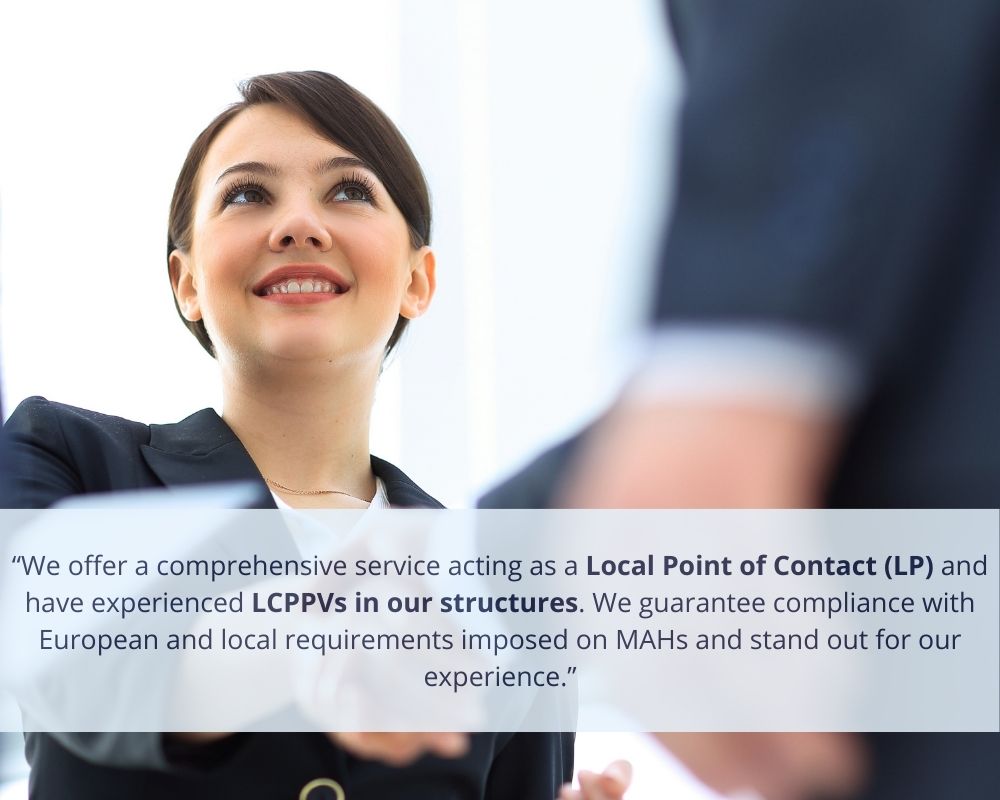
-
Product Development
-
Clinical Trials
-
Quality
-
GxP Audits
-
Regulatory Affairs
-
Pre-authorisation
- Regulatory Roadmap
- Scientific Advice
-
Product information
-
Dossier preparation
- Dossier Gap Analysis
- MA Handling
- Post-authorisation
- Regulatory outsourcing
-
Pre-authorisation
-
Pharmacovigilance
-
QP Service / Importer
Local Contact Person for Pharmacovigilance
Monitoring the safety of medicinal products is the responsibility of each Marketing Authorization Holder (MAH). For drugs registered in the European Union, it is necessary to appoint a QPPV (Qualified Person Responsible for Pharmacovigilance), when setting up a pharmacovigilance system (PV system). It is the responsibility of the QPPV to implement and maintain a PV system, including reporting adverse drug reactions (ADRs) and cooperation with Competent Authorities (CA).
The safety of medicinal products should be monitored not only in the country where the MAH has its registered office but also in all European countries where the MAH has a Marketing Authorization (MA) and thus plans to launch the medicinal product on the market. Therefore, in most EU countries Marketing Authorization Holder is obliged to appoint a Local Contact Person for Pharmacovigilance (LCPPV). This person is allowed to fulfill local PV obligations more efficiently, while patients and national CAs (NCAs) can contact MAH in the national language. Some countries do not legally impose an obligation to designate LCPPV, but national CAs reserve the right to contact MAHs in the national language only (e.g. Italy). In such a case, either the QPPV must be proficient in the local language or appoint the LCPPV.

LCPPV – legislative requirements
Depending on the country, the European Medicinal Agency (EMA) indicates different requirements for the local representative. The duties of the LCPPV (also known as the LPPV – Local Person for Pharmacovigilance, and in Germany the GPO – Graduated Plan Officer) are mainly to:
- contact NCAs;
- supervise local pharmacovigilance activities;
- and cooperate with the QPPV.
In Poland, according to the announcement of the President of the Office for Registration of Medicinal Products, Medical Devices and Biocidal Products (URPL) dated August 1st, 2014, the local representative should meet the following conditions:
- Have a fluent command of the Polish language;
- Reside or have a registered seat in the territory of Poland;
- Have theoretical and practical knowledge in the field of Pharmacovigilance;
- Be medically qualified or have access to a medically qualified person.
LCPPV’s responsibilities include:
- Availability of a 24-hour telephone;
- Collecting and forwarding spontaneous reports of adverse reactions and special situations;
- Monitoring local literature and translating literature sources into English, if needed;
- Communications with the reporter of the adverse reaction (follow-up), if needed;
- Maintaining a register of reports of adverse reactions and special situations;
- Maintaining contact with the local agency.
It is also worth mentioning that as a result of Brexit, the United Kingdom (UK) has separate requirements for QPPV and local contact persons. Admittedly, the CA UK – MHRA accepts QPPVs from within the EU, however, in such a case, the responsible party must notify the MHRA of a so-called National Contact Person (NCP). Unlike the LCPPV, the NCP has narrower responsibilities, focusing mainly on contacting the MHRA. In addition, the NCP must be located in the UK, and have access to the so-called UK PSMF and to adverse reaction reports of products having registries in the UK. To learn more about Brexit please read our article: click here.
When should the service be used?
The designation of a LCPPV in Poland is a local requirement, and marketing authorization holders with an MA in Poland are obliged to report the details of the local representative to URPL. Therefore, responsible MAHs that register products in Poland should keep this requirement in mind already at the stage of a registration process.
Why SciencePharma?
SciencePharma offers a comprehensive service of acting as a Local Point of Contact (LP) and has experienced LCPPVs in its structures. As LP we ensure:
- 24-hour service;
- Adverse event reports transmission;
- Conducting follow-up activities with reporters;
- Monitoring of over 70 local journals;
- Maintaining adverse events and special situations databases;
- Contact with national CAs.
It is worth noting that SciencePharma as a Local Point is regularly audited and inspected, and the mentioned processes have not revealed any non-conformities in our activities. We do all-out to align our local processes with the MAH’s global requirements. Upholding GVP compliance and ensuring seamless communication with the MAH aren’t just priorities; they are areas where we excel.
Using SciencePharma’s services guarantees compliance with European and local requirements imposed on MAHs. With more than a dozen years of experience in providing pharmacovigilance services at both global (QPPV) and local (LCPPV) levels we have comprehensive PV knowledge that we are glad to use in supporting our clients in audits and inspections.
If you are interested in cooperating with SciencePharma, please feel free to contact us. Our experienced team will provide you with more information about the described service.

